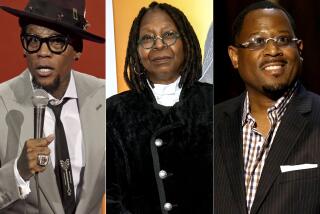President, NAACP Leader Take Step to Mend Fences
- Share via
WASHINGTON — President Bush ended his four-year standoff with the nation’s oldest civil rights organization Tuesday, telling the outgoing leader of the NAACP that he was looking for ways to broaden the Republican Party’s appeal to African American voters.
The 45-minute session in the Oval Office will hopefully “crack the ice” in a relationship that has become increasingly chilly over the last four years, NAACP president Kweisi Mfume said in an interview after the meeting.
Bush addressed the NAACP’s national convention in 2000 as a presidential candidate, but he has kept his distance since entering the White House.
Mfume said the meeting Tuesday was the result of a letter he sent Nov. 5, three days after Bush’s reelection, seeking to close the “chasm” between the Republican president and the nonpartisan organization with a heavily Democratic membership.
“He said for his part he was speaking as the titular head of the Republican Party, and that the outreach effort was not an effort that started and stopped with his reelection,” said Mfume, a onetime Democratic congressman from Maryland who announced last month that he was leaving his job at the National Assn. for the Advancement of Colored People at year’s end.
“He said they would continue to try to find ways to communicate their message in hopes that it would resonate with more people who are black and Latino.”
The Internal Revenue Service is investigating whether the NAACP violated its tax-exempt status by taking partisan stands during this year’s presidential election.
NAACP officials have said that the inquiry began after the association’s chairman, Julian Bond, harshly criticized Bush and his policies after the president declined an invitation to address the group’s national convention in July.
Bond said Tuesday that the accusations of partisanship had been misplaced, adding that the NAACP had enjoyed good relations with such administration officials as outgoing Secretary of State Colin L. Powell and national security advisor Condoleezza Rice, who has been nominated as Powell’s successor.
“I’ve been to the Pentagon for a briefing from Secretary of Defense Donald Rumsfeld,” Bond said.
“We object to policies, not to parties, and when we think the policies are wrong, we’re not afraid to say so.”
Mfume said the IRS probe was not discussed Tuesday.
Instead, he and Bush sought to find ways that administration officials and NAACP leaders could develop a new relationship, Mfume said. The president expressed concern about his lackluster image among African Americans and the effect of that image on his ability to address race relations, Mfume said. Bush won 11% of the black vote in November’s election, compared with the 8% he won four years earlier.
The meeting yielded potential political benefit for both men: Bush got an opportunity to show bipartisanship at a time that he needed Democratic votes for such second-term priorities as revamping Social Security, while Mfume, who harbored political ambitions in his home state, won some bipartisan bona-fides for the NAACP to counter the IRS probe.
Mfume said he and Bush were joined by Karl Rove, the president’s chief political strategist and the architect of last month’s reelection victory, who aimed to use the president’s second term to consolidate support among new voters as a path to a long-lasting GOP majority. The strategy is expected to rely in part on efforts to woo African Americans and Latinos through specific policies.
According to Mfume, Bush said that African Americans would benefit from his plan to allow younger workers to direct a portion of their Social Security retirement savings to private accounts. Theoretically, private accounts would offer a higher rate of return than the Social Security trust fund, thus enabling the accounts to grow more quickly.
Bush noted that the shorter life expectancy among African Americans often meant that they did not live long enough to reap the full rewards of the payroll taxes they contributed during decades of work, Mfume said.
A White House spokeswoman, Claire Buchan, said the two men had a “good discussion of a broad range of issues.”
Mfume said he believed that the meeting would open the door to Bush possibly addressing the NAACP next year for the first time as president.
Bush said that escalating rhetoric since the 2000 election had led him to decline the group’s invitations, Mfume said.
“He indicated that he felt an increasing harshness of tone and did not necessarily believe that he would have been received in the manner that ought to be accorded the office of the president,” Mfume said. “I can understand that to a large extent. It has been a very harsh environment in terms of the rhetoric that has been escalating for some time now.”
Mfume said he offered to postpone Tuesday’s meeting after hearing about the attack on a U.S. military mess tent in Iraq, but Bush wanted to proceed. After the meeting, Bush traveled to the presidential retreat at Camp David, Md., to begin an extended Christmas holiday.
As to whether a new relationship can be forged with a president whose views on civil rights and affirmative action have sparked protests from many African Americans, and whose quest for tax cuts are widely viewed as having benefited primarily the wealthiest Americans, Mfume said it all depends on Bush’s actions over the next four years.
“This is a second bite at the apple for him,” Mfume said. “I felt he was very genuine, very much concerned and very open in a way that may not have been the case before.”
Mfume’s successor at the NAACP has not been determined. NAACP officials have said that Mfume will stay on for six months as an unpaid consultant while a bipartisan search committee looks for a new president.
More to Read
Get the L.A. Times Politics newsletter
Deeply reported insights into legislation, politics and policy from Sacramento, Washington and beyond. In your inbox twice per week.
You may occasionally receive promotional content from the Los Angeles Times.









